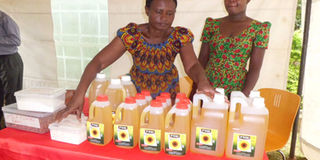Formula of making money from sunflower farming

Farmers are enjoying the profits of adding value to their produce by selling sunflower cooking oil. Photo by Lominda Afedraru
What you need to know:
While making the oil, the farmer must observe high standard of hygiene at all stages of production in compliance with public health guidelines, writes Lominda Afedraru
Bukedea cattle market, a dusty market centre located off the Bukedea-Kumi Road in Bukedea Town, is just a stone throw away from the ancient rocks, making it a potential tourist centre.
The smell of roast chicken wafts in the air as I venture into the centre. Chicken and beef roasting is a popular business here, drawing in hundreds of people particularly at the weekend.
It is in this centre that Norah Ebukalim, a farmer, and member of P’KWI farmers association has established their sunflower cooking oil business.
The group process their own cooking oil from sunflower that they grow on five acres thanks to the Regional Universities Forum for Capacity Building in Agriculture (RUFORUM).
RUFORUM is ensuring students pursuing courses in agricultural related topics reach out to farming communities to sensitise them about agribusiness initiatives especially value addition.
Planting
Sunflower grows well in areas with sparse rainfall, and the soil should be slightly acidic with a pH of between 6.0 and 7.5.
Several varieties, which include Sunbeam, Mammoth, Autumn Beauty, Teddy Bear and Fedha, are grown in different parts of the country, in particular eastern and northern. They mature in three to four months.
One needs at least an acre for a commercial venture, mono-ammonium phosphate or di-ammonium phosphate fertiliser or farmyard manure and certified seeds, which are readily available at agrovets.
To plant, the soil must be tilled to a fine tilth. Narrow furrows are then made and the seeds planted. Alternatively, one can broadcast the seeds and later thin out weak ones. After the initial weeding, the sunflower outgrows the weeds, especially if they are crowded, and further weeding is not required.
The process
To know whether the plant is ready for harvesting, the head turns brown at the back. This happens about 30 to 45 days after bloom. At this time, seed moisture is about 35 per cent.
The head is cut from the plant about four inches below the flower and then the seeds removed. This can be done manually or using a machine. The seeds are then dried until the moisture content is below one percent.

Milling
The group buys the sunflower seeds from farmers at Shs1,500 per kilogramme. The seeds must be properly dried, and cleaned thoroughly before milling.
They mill the seeds in a machine that also removes the husks. The milled seeds, now a thick paste, are then put in an oil extractor, which does the final extraction, letting the oil seep through taps.
A black paste-like residue called cake remains but the group do not have the technical expertise to turn it into polish, wax or paint. They however add some salt to it to make animal feed. Their milling machine is capable of processing 500 kilogrammes of seeds a day, to give them about 100 litres of the vegetable oil.
“It takes 10 kilogrammes of the seeds to produce two litres of the pure oil,” says Ebukalim.
Package
The processed oil is packaged into 1, 2, 3, 10 and 20-litre jerricans costing Shs10,000, Shs18,000, Shs25,000, Shs60,000 and Shs120,000 respectively.
The association members have a savings scheme where each member pays Shs2,000 as membership fee.
The group retail their products in five packages. Half a litre – the smallest – goes for Shs4,000; a litre at Shs8000; two litres at Shs16,000 and five litres at Shs40,000.
They also sell sunflower cake, which is a by-product that is a treasured animal feed, at Shs1500 a kilogramme to livestock farmers.
Uganda National Bureau of Standards regularly inspects their product that has a shelf-life of one year. The product, which they branded P’KWI sunflower cooking oil, has gained popularity in Bukedea, bringing in cash for the farmers.




